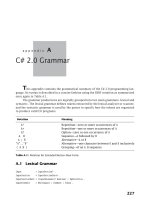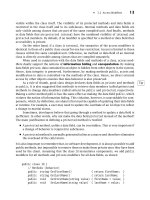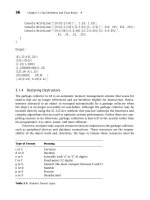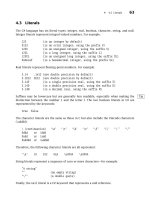Praise for C# 2.0: Practical Guide for Programmers 2005 phần 10 pptx
Bạn đang xem bản rút gọn của tài liệu. Xem và tải ngay bản đầy đủ của tài liệu tại đây (469.69 KB, 35 trang )
■
10.2 Attributes 215
public static void Main() {
Console.WriteLine(String.Format(FORMAT+"\n", "Type", "Abstract",
"Class", "Interface", "Primitive",
"Public", "Sealed", "ValueType")
);
GetTypeInfo("System.Int32");
GetTypeInfo("System.Type");
GetTypeInfo("MyInterface");
GetTypeInfo("MyAbstractClass");
GetTypeInfo("MyBaseClass");
GetTypeInfo("MyDerivedClass");
GetTypeInfo("MyStruct");
}
}
Output:
Type Abstract Class Interface Primitive Public Sealed ValueType
System.Int32 False False False True True True True
System.Type True True False False True False False
MyInterface True False True False False False False
MyAbstractClass True True False False False False False
MyBaseClass False True False False True False False
MyDerivedClass False True False False False True False
MyStruct False False False False False True True
10.2 Attributes
An attribute is an annotation that can be applied to global targets, including assemblies
or .NET modules as well as other targets including classes, methods, fields, parameters,
properties, return types, and events. It is a way to extend the metadata stored in an
assembly or module with user-defined custom metadata. Each attribute, therefore, tells
the compiler to gather metadata about a particular target at compile-time. This metadata
can be later retrieved at runtime by an application via reflection. An attribute speci-
fies an optional global target, either an executable assembly or a .NET module, followed
by optional input arguments, all within square brackets. The EBNF definition is given
here:
EBNF
Attributes = AttributeSections .
AttributeSection = "[" AttributeTargetSpecifier? AttributeList ", "? "]" .
AttributeTargetSpecifier = AttributeTarget ":" .
Attribute = AttributeName AttributeArguments? .
216 Chapter 10: Reflection and Attributes
■
AttributeArguments = ( "(" PositionalArgumentList? ")" )
| ( "(" PositionalArgumentList ","
NamedArgumentList ")" )
| ( "(" NamedArgumentList ")" ) .
Each attribute is implicitly defined by a class that inherits from the abstract class Attribute
under the System namespace. The suffix Attribute is typically added by convention to
all derived classes. For example, a class Portable that is compliant with the CLS in an
application can be specified as follows:
using System.Attribute;
[CLSCompliant] // or [CLSCompliantAttribute]
public class Portable { }
where the CLSCompliant attribute is predefined in the System.Attribute namespace as:
public sealed class CLSCompliantAttribute : Attribute { }
There are many predefined attribute classes in the .NET Framework, but three attributes
are particularly useful for developers: Serializable, Conditional, and Obsolete. These
three attributes are covered in greater detail in the following three subsections.
10.2.1 Using Attributes for Exception Serialization
Serialization is the process of storing the state of an object to a storage medium in order
to make it transportable from one machine to another. Serialization is therefore useful for
data storage and for passing objects across application domains. To meet this objective,
the state of an object represented by its class name, its public and private fields, and its
assembly is converted to a stream of bytes.
The attribute [Serializable] is used to make objects serializable. For example, it is
Tip
important to serialize all exception classes so that exceptions may be sent across different
machines. The following user-defined class exception enables serialization by adding the
[Serializable] attribute to the class as shown here:
using System;
using System.Runtime.Serialization;
[Serializable]
public class UserException: Exception, ISerializable {
// Three basic constructors.
public UserException() {}
public UserException(string msg) : base(msg) {}
public UserException(string msg, Exception inner) : base(msg, inner) {}
■
10.2 Attributes 217
// Deserialization constructor.
public UserException(SerializationInfo info,
StreamingContext context) : base(info, context){}
}
This exception class implements the ISerializable interface, the three basic constructors
already discussed in Section 6.4, and a deserialization constructor to create an object from
previously serialized data.
10.2.2 Using Attributes for Conditional Compilation
In C/C++, developers use assertions as preconditions in order to control conditional
compilation:
void Require(bool expr) { }
void Fct(int n) {
#if PRECONDITION
Require(n > 0);
#endif
}
Although C/C++ preprocessing directives are supported in C#, similar control in C# can
also be achieved with the aid of attributes. In order to do so, the System.Diagnostics
namespace must be imported (line 1). The equivalent C# version of the C/C++ pro-
gram above is given below where the attribute Conditional has a single argument called
"PRECONDITION" on line 4:
1 using System.Diagnostics;
2
3 public class TestConditional {
4 [Conditional("PRECONDITION")]
5 public static void Require(bool expr) { }
6
7 public static void Fct(int n) {
8 Require(n > 0);
9
10 }
11 }
The conditional attribute works differently than conditional compilation via #if/#endif.
A method adorned with this attribute is always compiled into the assembly. The con-
ditional attribute is used by the C# compiler to eliminate call sites to that method if
the associated conditional is defined. For example, by compiling the previous class with
or without /define:PRECONDITION, the code for the static method Require on line 5 is
always generated by the compiler. However, without the /define:PRECONDITION, the call
to Require on line 8 is removed.
218 Chapter 10: Reflection and Attributes
■
10.2.3 Using Attributes for Obsolete Code
Suppose now that the Abs method has been improved and renamed as Absolute. To tell
developers to use Absolute instead of Abs, the attribute Obsolete provides a warning when
an older version of a member, in this case a method, is used. An informative message
promoting the use of the newer method is generated at compile-time.
using System;
public class Math {
[Obsolete ("Use Math.Absolute() instead.")]
public static int Abs(int n) { return (n < 0) ? -n : n; }
}
Therefore, upon compiling TestAbs and AbsObsolete as shown here:
csc TestAbs.cs AbsObsolete.cs
the following warning message is generated:
TestAbs.cs(3,51): warning CS0612: ’Math.Abs(int)’ is obsolete:
’Use Math.Absolute() instead.’
Even with a warning, an executable is still generated. However, after some period of time,
developers may wish to force their users to update their code by replacing an older ver-
sion of a class member with a newer one, for example, replacing Abs with Absolute.By
adding a true parameter to the Obsolete attribute, an error message instead of a warning
message is generated. Since the default value of the second parameter is false, only a
warning message is generated when the parameter is omitted as shown here. However,
unlike a warning, no executable is generated if the second parameter of Obsolete is true
and obsolete code, such as Abs, remains part of the application.
using System;
public class Math {
[Obsolete ("Use Math.Absolute() instead.", true)]
public static int Abs(int n) { return (n < 0) ? -n : n; }
}
Hence, the compilation of the previous code using Abs generates the following error
message:
TestAbs.cs(3,51): error CS0619: ’Math.Abs(int)’ is obsolete:
’Use Math.Absolute() instead.’
10.2.4 Defining User-Defined Attributes
When a class library or framework contains hundreds if not thousands of classes, it is very
useful to “tag" classes with user-defined attributes. These tags are then used to later search
■
10.2 Attributes 219
for those classes that satisfy specific attributes. As mentioned earlier, an attribute class
derives from System.Attribute with an optional Attribute suffix to its name. The con-
text of the new attribute is specified by AttributeUsage using System.AttributeTargets.
The latter is an enumeration that provides all possible targets, such as module, class,
method, and so on. For example, if invariant (protected) methods that check the bounds
of private fields have been implemented for many critical classes of an application, it is
convenient to define a invariant attribute that tags these specific methods as targets using
AttributeTargets.Method as shown here:
using System.Attribute;
[AttributeUsage(AttributeTargets.Method)]
public class InvariantAttribute : Attribute {
public InvariantAttribute() {}
}
This new attribute can now be used to tag methods in the following manner:
using System.Attribute;
public class Critical {
[Invariant]
protected void InvariantMethod() { }
}
If an invariant method has been or will be tested by a quality assurance team, adding
a Test enum parameter to the Attributes namespace is helpful. The following modifica-
tion includes both a default constructor that initializes status to NotDone, and a second
constructor that initializes status, defined as a Status property, to a Test parameter.
using System;
namespace Attributes {
public enum Test { NotDone, Failed, InProgress, Passed }
[AttributeUsage(AttributeTargets.Method)]
public class InvariantAttribute : Attribute {
public InvariantAttribute() {
status = Test.NotDone;
}
public InvariantAttribute(Test status) {
Status = status;
}
public Test Status {
get { return status; }
220 Chapter 10: Reflection and Attributes
■
set { status = value; }
}
private Test status;
}
}
10.2.5 Using User-Defined Attributes
Assuming that the previous user-defined attribute Invariant is in the file Attributes.cs,
the component Attributes.dll is generated as follows:
csc /t:library Attributes.cs
To use the Invariant attribute within an application, the Attributes component must
be imported as shown next. In this case, four classes (A, B, C, and D) are encapsulated
in MyNamespace and stored in a file called UsingAttributes.cs. Each class, except D,is
preceded by an invariant attribute that denotes its current testing status.
using System;
using System.Reflection;
using Attributes;
namespace MyNamespace {
public class A {
[Invariant]
protected void InvariantMethod() { }
// Other methods
}
public class B {
[Invariant(Test.Failed)]
protected void InvariantMethod() { }
// Other methods
}
public class C {
[Invariant(Status = Test.InProgress)]
protected void InvariantMethod() { }
// Other methods
}
public classD{}
// And many other classes
}
In order to compile the previous file, the compiler command must refer to the
Attributes.dll component as follows:
csc /t:library /r:Attributes.dll UsingAttributes.cs
■
10.2 Attributes 221
10.2.6 Extracting Attributes Using Reflection
As mentioned previously, reflection is used to search and find all attributes associated with
an assembly (.exe or .dll), its modules, and other members. Using the UsingAttributes.dll
component, the following example illustrates how the assembly file
1
is first loaded on
line 8 by invoking Assembly.Load. Using the GetModule method on line 9, the component
UsingAttributes.dll is retrieved and assigned to module. All classes contained in module
are then extracted and stored in an array types on line 11. From this point forward, the
next program does the following:
■
Prints all classes found in UsingAttributes.dll (lines 13–16).
■
Prints for each class a list of all public methods (lines 18–21). Note that the GetMethods
method retrieves only public methods by default.
■
Prints for each class a list of all non-public instance methods (lines 23–27). In this
case, it is necessary to specify the kind of methods. Since invariants are protected
instance methods, a bit filter called BindingFlags is set to flag those methods that
are both instance and non-public (i.e., private and protected).
■
Prints all classes that have invariant attributes (lines 29–36) using the same filter.
1 using System;
2 using System.Reflection;
3 using Attributes;
4
5 namespace MyNamespace {
6 class TypesWithInvariants {
7 public static void Main() {
8 Assembly assembly = Assembly.Load("UsingAttributes");
9 Module module = assembly.GetModule("UsingAttributes.dll");
10
11 Type[] types = module.FindTypes(Module.FilterTypeName, "*");
12
13 Console.WriteLine("Types found in ’UsingAttributes.dll’: ");
14 foreach(Type t in types)
15 Console.Write("{0} ", t.Name);
16 Console.WriteLine();
17
18 Console.WriteLine("\nFor every type, list all public methods:");
19 foreach(Type t in types)
20 foreach (MethodInfo m in t.GetMethods())
21 Console.WriteLine("{0} has {1}", t, m.Name);
22
1
Based on the Common Object File Format (COFF).
222 Chapter 10: Reflection and Attributes
■
23 Console.WriteLine("\nFor every type, list all non-public instance methods:");
24 foreach(Type t in types)
25 foreach (MethodInfo m in t.GetMethods(BindingFlags.Instance |
26 BindingFlags.NonPublic))
27 Console.WriteLine("{0} has {1}", t, m.Name);
28
29 Console.WriteLine("\nTypes that have invariant attributes:");
30 foreach (Type t in types)
31 foreach (MethodInfo m in t.GetMethods(BindingFlags.Instance |
32 BindingFlags.NonPublic))
33 foreach (Attribute attrib in m.GetCustomAttributes(true)) {
34 if (attrib is InvariantAttribute)
35 Console.WriteLine("{0} has {1}", t, m.Name);
36 }
37 }
38 }
39 }
The output of the preceding program is generated next. It is important to recall that all
classes derive from the root class and, therefore, include all public and protected methods
of object.
Types found in ‘UsingAttributes.dll’:
ABCD
For every type, list all public methods:
MyNamespace.A has GetType
MyNamespace.A has ToString
MyNamespace.A has Equals
MyNamespace.A has GetHashCode
MyNamespace.B has GetType
MyNamespace.B has ToString
MyNamespace.B has Equals
MyNamespace.B has GetHashCode
MyNamespace.C has GetType
MyNamespace.C has ToString
MyNamespace.C has Equals
MyNamespace.C has GetHashCode
MyNamespace.D has GetType
MyNamespace.D has ToString
MyNamespace.D has Equals
MyNamespace.D has GetHashCode
■
10.3 Where to Go from Here 223
For every type, list all non-public instance methods:
MyNamespace.A has InvariantMethod
MyNamespace.A has MemberwiseClone
MyNamespace.A has Finalize
MyNamespace.B has InvariantMethod
MyNamespace.B has MemberwiseClone
MyNamespace.B has Finalize
MyNamespace.C has InvariantMethod
MyNamespace.C has MemberwiseClone
MyNamespace.C has Finalize
MyNamespace.D has MemberwiseClone
MyNamespace.D has Finalize
Types that have invariant attributes:
MyNamespace.A has InvariantMethod
MyNamespace.B has InvariantMethod
MyNamespace.C has InvariantMethod
10.3 Where to Go from Here
One of the worst things that can happen in any software-development environment is
not knowing that a solution, either a class or namespace in our object-oriented context,
already exists. The danger, of course, is that the “wheel is reinvented” by re-designing and
re-implementing a similar solution without the benefit of extensive testing in the public
domain. Although we will never have enough days in our lives to be proficient with every
class in the .NET Framework, our duty as developers is to be aware that such abstractions
exist and to exploit their use in our applications whenever possible.
The .NET Framework is a huge library, and although it was not the mandate of this
short book to cover the .NET Framework in detail, it is useful nonetheless to end with a
quick roadmap of the core namespaces contained in this framework. All core classes and
namespaces encapsulated by the System namespace are listed here in alphabetical order
with a brief description of their main purpose.
Name: Main purpose:
System Fundamental Base Classes
CodeDom Code Document Object Model for XML documents
Collections List-type and dictionary-type classes and interfaces
ComponentModel Component (design- and runtime) behavior
Configuration Access and manipulation of .CONFIG files
Configuration.Assemblies Access and manipulation of .DLL and .EXE files
Configuration.Install Base class for all component installers
Data Data access via ADO.NET
224 Chapter 10: Reflection and Attributes
■
Data.Common Data providers
Data.OleDb OLE DB and ODBC providers
Data.SqlClient SQL server data provider
Data.SqlTypes SQL server native data types
Diagnostics Application debugging and code execution tracing
Diagnostics.SymbolStore Read, write, debug symbolic information from
MSIL maps
DirectoryServices Access active directory service providers such as
IIS, LDAP, etc.
Drawing Graphical Drawing Interface (GDI+)
EntrepriseServices Server-based support for transactions and message
queuing
Globalization Culture-specific support (languages, calendars,
currency, etc.)
IO Input/Output (Streams, Readers, Writers)
Management Windows Management Instrumentation (disk space and
CPU utilization)
Messaging Message queuing on the network
Net Networking (HTTP protocol, authentication, etc.)
Net.Sockets Implementation of the Windows Sockets interface
Reflection Extraction of metadata to mirror assemblies,
types, etc.
Reflection.Emit Emission and execution using metadata and MSIL
Resources Resource Management of culture-specific objects and
strings
Runtime.CompilerServices Specification/modification of CLR’s metadata for
compiler writers
Runtime.InteropServices COM interoperability
Runtime.Remoting Distributed applications in using/publishing remote
objects
Runtime.Serialization Serialization and deserialization of objects
Security Security manager and permissions classes
Security.Cryptography Secure coding and decoding of data
ServiceProcess Windows services to be installed and run without
a user interface
Text Text Manipulation (ASCII, Unicode, UTF-7, and UTF-8)
Text.RegularExpressions Regular expression engine
Threading Multi-thread programming (synchronization,
grouping, etc.)
Timer Server-based timer component for multi-threaded
applications
Web Browser/server communication services using the
HTTP protocol
Web.Services Development and use of web services
■
Exercises 225
Web.UI User interface development of controls and pages in
a web application
Windows.Forms User interface development Windows forms in a
Windows-based application
Xml Processing of XML (schemas, serialization,
parsing, etc.)
Exercises
Exercise 10-1. Enumerations in C# provide more information than their equivalent in
C++ since their corresponding names (string values) are stored in the assembly as meta-
data. Extract the names of an enumeration via the GetNames method and use them to extend
a new enumeration type at runtime with System.Reflection.Emit.
Exercise 10-2. Write a class Assertion that uses conditional attributes with two over-
loaded static methods, Require and Ensure, that throw PreconditionException and
PostconditionException, respectively, if the evaluation of their boolean expressions is
not true.
public class PreconditionException : Exception { }
public class PostconditionException : Exception { }
public class Assertion {
[Conditional("Precondition")]
public static void Require(bool expr) { }
[Conditional("Precondition")]
public static void Require(bool expr, string msg) { }
[Conditional("Postcondition")]
public static void Ensure(bool expr) { }
[Conditional("Postcondition")]
public static void Ensure(bool expr, string msg) { }
}
appendix A
C# 2.0 Grammar
This appendix contains the grammatical summary of the C# 2.0 programming lan-
guage. Its syntax is described in a concise fashion using the EBNF notation as summarized
once again in Table A.1.
The grammar productions are logically grouped into two main grammars: lexical and
syntactic. The lexical grammar defines tokens extracted by the lexical analyzer or scanner,
and the syntactic grammar is used by the parser to specify how the tokens are organized
to produce valid C# programs.
Notation Meaning
A* Repetition—zero or more occurrences of A
A+ Repetition—one or more occurrences of A
A? Option—zero or one occurrence of A
AB Sequence—A followed by B
A|B Alternative—A or B
"0" "9" Alternative—one character between 0 and 9 inclusively
(AB) Grouping—of an ABsequence
Table A.1: Notation for Extended Backus–Naur Form.
A.1 Lexical Grammar
Input = InputSection? .
InputSection = InputSectionPart+ .
InputSectionPart = (InputElements? NewLine) | PpDirective .
InputElement = Whitespace | Comment | Token .
227
228 Appendix A: C# 2.0 Grammar
■
A.1.1 Line Terminators
All line terminators are represented by the Newline production. A Newline is either a
carriage return (CR) as the \u000D or ‘\r’ character, a line feed (LF) as the \u000A or
‘\n’ character, a (CR) followed by (LF), a line separator (LS) as the \u2028 character, or a
paragraph separator (PS) as the \u2029 character.
NewLine = CR | LF | CRLF | LS | PS .
A.1.2 White Space
A white space is any character with Unicode Class Zs, a horizontal tab (HT) as the \u0009
or ‘\t’ character, a vertical tab (VT) as the \u000B or ‘\v’ character, or a form feed (FF)
as the \u000C or ‘\f’ character.
Whitespace = AnyCharacterWithUnicodeClassZs | HT | VT | FF .
A.1.3 Comments
Comment = SingleLineComment | DelimitedComment .
SingleLineComment = "//" InputCharacters? .
InputCharacter = AnyUnicodeCharacterExceptANewLine .
DelimitedComment = "/*" DelimitedCommentCharacters? "*/" .
DelimitedCommentCharacter = NotAsterisk | ("*" NotSlash) .
NotAsterisk = AnyUnicodeCharacterExcept "*" .
NotSlash = AnyUnicodeCharacterExcept "/" .
A.1.4 Tokens
Token = Identifier | Keyword | Literal | OperatorOrPunctuator .
Note: null, true, and false are keywords as well as literals.
A.1.5 Unicode Character Escape Sequences
UnicodeEscapeSequence = ("\u" FourHexDigits) | ("\U" FourHexDigits FourHexDigits) .
FourHexDigits = HexDigit HexDigit HexDigit HexDigit .
A.1.6 Identifiers
Identifier = AvailableIdentifier | ("@" IdentifierOrKeyword) .
AvailableIdentifier = An IdentifierOrKeyword that is not a Keyword .
IdentifierOrKeyword = IdentifierStartCharacter IdentifierPartCharacters? .
IdentifierStartCharacter = LetterChar | "_" .
IdentifierPartCharacter = LetterChar | DecimalDigitChar | ConnectingChar
| CombiningChar | FormattingChar .
■
A.1 Lexical Grammar 229
A LetterChar is either a Unicode character of classes Lu, Ll, Lt, Lm, Lo, or Nl; or a Unicode-
character-escape-sequence representing a character of classes Lu, Ll, Lt, Lm, Lo, or Nl.
A CombiningChar is either a Unicode character of classes Mn or Mc; or a Unicode-character-
escape-sequence representing a character of classes Mn or Mc. A DecimalDigitChar
is either a Unicode character of the class Nd, or a Unicode-character-escape-sequence
representing a character of the class Nd. A ConnectingChar is either a Unicode char-
acter of the class Pc, or a Unicode-character-escape-sequence representing a character
of the class Pc. A FormattingChar is either a Unicode character of the class Cf, or a
Unicode-character-escape-sequence representing a character of the class Cf.
A.1.7 Keywords
abstract as base bool break
byte case catch char checked
class const continue decimal default
delegate do double else enum
event explicit extern false finally
fixed float for foreach goto
if implicit in int interface
internal is lock long namespace
new null object operator out
override params private protected public
readonly ref return sbyte sealed
short sizeof stackalloc static string
struct switch this throw true
try typeof uint ulong unchecked
unsafe ushort using virtual void
volatile while
A.1.8 Literals
Literal = BooleanLiteral | IntegerLiteral | RealLiteral
| CharacterLiteral | StringLiteral | NullLiteral .
BooleanLiteral = "true" | "false" .
IntegerLiteral = DecimalIntLiteral | HexIntLiteral .
DecimalIntLiteral = DecimalDigits IntegerTypeSuffix? .
DecimalDigit = "0" "9" .
IntegerTypeSuffix = "U" | "u" | "L" | "l" | "Ul" | "ul" | "Lu" | "lu" | "UL" | "uL" | "LU" | "lU" .
HexIntegerLiteral = ("0x" | "0X") HexDigits IntegerTypeSuffix? .
HexDigit = "0 9" | "A" "F" | "a" "f" .
RealLiteral = ( DecimalDigits "." DecimalDigits ExponentPart? RealTypeSuffix? )
| ( "." DecimalDigits ExponentPart? RealTypeSuffix? )
| ( DecimalDigits ExponentPart RealTypeSuffix? )
| ( DecimalDigits RealTypeSuffix ) .
230 Appendix A: C# 2.0 Grammar
■
ExponentPart = ("e" | "E") Sign? DecimalDigits .
Sign = "+" | "-" .
RealTypeSuffix = "F" | "f" | "D" | "d" | "M" | "m" .
CharacterLiteral = "’" Character "’" .
Character = SingleCharacter | SimpleEscapeSequence | HexEscapeSequence | UnicodeEscapeSequence .
SingleCharacter = Any Character Except Quote, Escape, and NewLine .
SimpleEscapeSequence = "\’" | "\\" | "\0" | "\a" | "\b" | "\f" | "\n" | "\r" | "\t" | "\v" | DQuote .
DQuote = "\"" (\u0022) .
Quote = "’" (\u0027) .
Escape = "\\" (\u005C) .
HexEscapeSequence = "\x" HexDigit HexDigit? HexDigit? HexDigit? .
StringLiteral = RegularStringLiteral | VerbatimStringLiteral .
RegularStringLiteral = " RegularStringLiteralCharacters? " .
RegularStringLiteralCharacter = SingleRegularStringLiteralCharacter | SimpleEscapeSequence
| HexadecimalEscapeSequence | UnicodeEscapeSequence .
SingleRegularStringLiteralCharacter = Any Character Except DQuote, Escape, and NewLine .
VerbatimStringLiteral = "@" DQuote VerbatimStringLiteralCharacters? DQuote .
VerbatimStringLiteralCharacter = SingleVerbatimStringLiteralCharacter | QuoteEscapeSequence .
SingleVerbatimStringLiteralCharacter = Any Character Except DQuote .
QuoteEscapeSequence = "\’" .
NullLiteral = "null" .
A.1.9 Operators and Punctuators
{}[]().,=;
+-*/%&|ˆ!˜
=<>?::++ &&||->
== != <= >= += -= *= /= %= &=
|= ˆ= <<= << > > > >=
A.1.10 Preprocessing Directives
PpDirective = PpDeclaration | PpConditional | PpLine | PpDiagnostic | PpRegion | PpPragma .
PpNewLine = Whitespace? SingleLineComment? NewLine .
ConditionalSymbol = Any IdentifierOrKeyword Except "true" or "false" .
PpExpr = Whitespace? PpOrExpr Whitespace? .
PpOrExpr = PpAndExpr (Whitespace? "||" Whitespace? PpAndExpr)* .
PpAndExpr = PpEqualityExpr (Whitespace? "&&" Whitespace? PpEqualityExpr)* .
PpEqualityExpr = PpUnaryExpr (Whitespace? ("==" | "!=") Whitespace? PpUnaryExpr)* .
PpUnaryExpr = ("!" Whitespace? PpPrimaryExpr)* .
PpPrimaryExpr = "true" | "false" | ConditionalSymbol | "(" Whitespace? PpExpr Whitespace? ")" .
PpDeclaration = Whitespace? "#" Whitespace? ("define"|"undef") Whitespace ConditionalSymbol PpNewLine .
PpConditional = PpIfSection PpElifSections? PpElseSection? PpEndif .
■
A.2 Syntactic Grammar 231
PpIfSection = Whitespace? "#" Whitespace? "if" Whitespace PpExpr PpNewLine ConditionalSection? .
PpElifSection = Whitespace? "#" Whitespace? "elif" Whitespace PpExpr PpNewLine ConditionalSection? .
PpElseSection = Whitespace? "#" Whitespace? "else" PpNewLine ConditionalSection? .
PpEndifLine = Whitespace? "#" Whitespace? "endif" PpNewLine .
ConditionalSection = InputSection | SkippedSection .
SkippedSection = SkippedSectionPart+ .
SkippedSectionPart = (SkippedCharacters? NewLine) | PpDirective .
SkippedCharacters = Whitespace? NotNumberSign InputCharacters? .
NotNumberSign = Any InputCharacter Except "#" .
PpLine = Whitespace? "#" Whitespace? "line" Whitespace LineIndicator PpNewLine .
LineIndicator = (DecimalDigits Whitespace FileName) | DecimalDigits | "default" .
FileName = "\"" FileNameCharacters "\"" .
FileNameCharacter = Any InputCharacter Except "\"" .
PpDiagnostic = Whitespace? "#" Whitespace? ("error" | "warning") PpMessage .
PpMessage = NewLine | (Whitespace InputCharacters? NewLine) .
PpRegion = PpStartRegion ConditionalSection? PpEndRegion .
PpStartRegion = Whitespace? "#" Whitespace? "region" PpMessage .
PpEndRegion = Whitespace? "#" Whitespace? "endregion" PpMessage .
PpPragma = Whitespace? "#" Whitespace? "pragma" PragmaBody PpNewLine .
PragmaBody = PragmaWarningBody .
PragmaWarningBody = "warning" Whitespace WarningAction ( Whitespace WarningList )? .
WarningAction = "disable" | "restore" .
WarningList = DecimalDigits ( Whitespace? "," Whitespace? DecimalDigits )* .
A.2 Syntactic Grammar
A.2.1 Namespace, Type, and Simple Names
NamespaceName = NamespaceOrTypeName .
TypeName = NamespaceOrTypeName .
NamespaceOrTypeName = ( Identifier TypeArgumentList? )
| ( "." Identifier TypeArgumentList? )*
| QualifiedAliasMember .
SimpleName = Identifier TypeArgumentList? .
QualifiedAliasMember = Identifier "::" Identifier TypeArgumentList? .
A.2.2 Types
Type = ValueType | ReferenceType | TypeParameter .
ValueType = StructType | EnumType | NullableType .
StructType = TypeName | SimpleType .
232 Appendix A: C# 2.0 Grammar
■
SimpleType = NumericType | "bool" .
NumericType = IntegralType | RealType | "decimal" | "char" .
IntegralType = "sbyte" | "short" | "int" | "long" | "byte" | "ushort" | "uint" | "ulong" .
RealType = "float" | "double" .
EnumType = TypeName .
NullableType = ValueType "?" .
ReferenceType = ClassType | InterfaceType | ArrayType | DelegateType .
ClassType = TypeName | "object" | "string" .
InterfaceType = TypeName .
ArrayType = NonArrayType RankSpecifiers .
NonArrayType = Type .
RankSpecifier = "[" DimSeparators? "]" .
DimSeparators = ","+ .
DelegateType = TypeName .
A.2.3 Variables
VariableReference = Expr .
A.2.4 Expressions
Argument = Expr | ("ref" | "out") VariableReference .
PrimaryExpr = PrimaryNoArrayCreationExpr | ArrayCreationExpr .
PrimaryNoArrayCreationExpr = Literal | SimpleName | ParenthesizedExpr | MemberAccess
| InvocationExpr | ElementAccess | ThisAccess | BaseAccess | PostIncrementExpr
| PostDecrementExpr | ObjectCreationExpr | DelegateCreationExpr | TypeofExpr
| SizeofExpr | CheckedExpr | UncheckedExpr | DefaultValueExpr |
| AnonymousMethodExpr .
ParenthesizedExpr = "(" Expr ")" .
MemberAccess = ( PrimaryExpr "." Identifier TypeArgumentList? )
| ( PredefinedType "." Identifier TypeArgumentList? )
| ( QualifiedAliasMember "." Identifier ) .
InvocationExpr = PrimaryExpr "(" ArgumentList? ")" .
ElementAccess = PrimaryNoArrayCreationExpr "[" ExprList "]" .
ThisAccess = "this" .
BaseAccess = "base" ( "." Identifier)|("["ExprList "]" ) .
PostIncrementExpr = PrimaryExpr "++" .
PostDecrementExpr = PrimaryExpr " " .
ObjectCreationExpr = "new" Type "(" ArgumentList? ")" .
DelegateCreationExpr = "new" DelegateType "(" Expr ")" .
TypeofExpr = "typeof" "(" Type | "void" ")" .
CheckedExpr = "checked" "(" Expr ")" .
UncheckedExpr = "unchecked" "(" Expr ")" .
■
A.2 Syntactic Grammar 233
DefaultValueExpr = "default" "(" Type ")".
AnonymousMethodExpr = "delegate" AnonymousMethodSignature? Block .
PredefinedType = "bool" | "byte" | "char" | "decimal" | "double" | "float" | "int" | "long"
| "object" | "sbyte" | "short" | "string" | "uint" | "ulong" | "ushort" .
ArrayCreationExpr = ( "new" NonArrayType "[" ExprList "]" RankSpecifiers? ArrayInitializer? )
| ( "new" ArrayType ArrayInitializer ) .
UnaryExpr = PreIncExpr | PreDecExpr | CastExpr | ( ("+"|"-"|"!"|"˜"|"*")? PrimaryExpr ) .
PreIncExpr = "++" UnaryExpr .
PreDecExpr = " " UnaryExpr .
CastExpr = "(" Type ")" UnaryExpr .
MultiplicativeExpr = UnaryExpr (MulOp UnaryExpr)* .
AdditiveExpr = MultiplicativeExpr (AddOp MultiplicativeExpr)* .
ShiftExpr = AdditiveExpr (ShiftOp AdditiveExpr)* .
RelationalExpr = ShiftExpr ( (RelOp ShiftExpr) | (TypeTestingOp Type) )* .
EqualityExpr = RelationalExpr (EquOp RelationalExpr)* .
AndExpr = EqualityExpr ("&" EqualityExpr)* .
ExclusiveOrExpr = AndExpr ("ˆ" AndExpr)* .
InclusiveOrExpr = ExclusiveOrExpr ("|" ExclusiveOrExpr)* .
ConditionalAndExpr = InclusiveOrExpr ("&&" InclusiveOrExpr)* .
ConditionalOrExpr = ConditionalAndExpr ("||" ConditionalAndExpr)* .
NullCoalescingExpr = ConditionalOrExpr ("??" ConditionalOrExpr)* .
ConditionalExpr = NullCoalescingExpr | ( NullCoalescingExpr "?" Expr ":" Expr) .
Assignment = UnaryExpr AssignmentOp Expr
AssignmentOp = "=" | "+=" | "-=" | "*=" | "/=" | "%=" | "&=" | "|=" | "ˆ=" | "<<=" | ">>=" .
MulOp = "*" | "/" | "%" .
AddOp = "+" | "-" .
ShiftOp = "<<" | ">>" .
RelOp = "<" | ">" | "<=" | ">=" .
TypeTestingOp = "is" | "as" .
EquOp = "==" | "!=" .
Expr = ConditionalExpr | Assignment .
ConstantExpr = Expr .
BooleanExpr = Expr .
A.2.5 Statements
Stmt = EmbeddedStmt | LabeledStmt | DeclStmt .
EmbeddedStmt = ExprStmt | EmptyStmt | Block | SelectionStmt | IterationStmt
| JumpStmt | TryStmt | CheckedStmt | UncheckedStmt | LockStmt
| UsingStmt | YieldStmt .
ExprStmt = StmtExpr ";" .
StmtExpr = InvocationExpr | ObjectCreationExpr | Assignment
| PostIncExpr | PostDecExpr | PreIncExpr | PreDecExpr .
234 Appendix A: C# 2.0 Grammar
■
EmptyStmt = ";" .
Block = "{" Stmts? "}" .
SelectionStmt = IfStmt | SwitchStmt .
IfStmt = "if" "(" BooleanExpr ")" EmbeddedStmt ( "else" EmbeddedStmt )? .
BooleanExpr = Expr .
SwitchStmt = "switch" "(" Expr ")" SwitchBlock .
SwitchBlock = "{" SwitchSections? "}" .
SwitchSection = SwitchLabels Stmts .
SwitchLabel = ( "case" ConstantExpr ":")|("default" ":" ) .
IterationStmt = WhileStmt | DoStmt | ForStmt | ForeachStmt .
WhileStmt = "while" "(" BooleanExpr ")" EmbeddedStmt .
DoStmt = "do" EmbeddedStmt "while" "(" BooleanExpr ")" ";" .
ForStmt = "for" "(" ForInitializer? ";" ForCondition? ";" ForIterator? ")" EmbeddedStmt .
ForInitializer = LocalVariableDecl | StmtExprList .
ForCondition = BooleanExpr .
ForIterator = StmtExprList .
ForeachStmt = "foreach" "(" Type Identifier "in" Expr ")" EmbeddedStmt .
JumpStmt = BreakStmt | ContinueStmt | GotoStmt | ReturnStmt | ThrowStmt .
BreakStmt = "break" ";" .
ContinueStmt = "continue" ";" .
GotoStmt = "goto" ( Identifier | ("case" ConstantExpr) | Default ) ";" .
ReturnStmt = "return" Expr? ";" .
ThrowStmt = "throw" Expr? ";" .
TryStmt = "try" Block ( CatchClauses | FinallyClause )? | ( CatchClauses FinallyClause )? .
CatchClauses = ( SpecificCatchClauses GeneralCatchClause? )
| ( SpecificCatchClauses? GeneralCatchClause ) .
SpecificCatchClauses = SpecificCatchClause+ .
SpecificCatchClause = "catch" "(" ClassType Identifier? ")" Block .
GeneralCatchClause = "catch" Block .
FinallyClause = "finally" Block .
CheckedStmt = "checked" Block .
UncheckedStmt = "unchecked" Block .
LockStmt = "lock" "(" Expr ")" EmbeddedStmt .
UsingStmt = "using" "(" ResourceAcquisition ")" EmbeddedStmt .
YieldStmt = ("yield" "return" Expr) | ("yield" "break") .
ResourceAcquisition = LocalVariableDecl | Expr .
LabeledStmt = Identifier ":" Stmt .
DeclStmt = ( LocalVariableDecl | LocalConstantDecl ) ";" .
LocalVariableDecl = Type LocalVariableDecltorList .
■
A.2 Syntactic Grammar 235
LocalVariableDecltor = Identifier ( "=" LocalVariableInitializer )? .
LocalVariableInitializer = Expr | ArrayInitializer .
LocalConstantDecl = "const" Type ConstantDecltorList .
ConstantDecltor = Identifier "=" ConstantExpr .
A.2.6 Namespaces
CompilationUnit = ExternAliasDirectives? UsingDirectives? GlobalAttributes? NamespaceMemberDecls? .
NamespaceDecl = "namespace" QualifiedIdentifier NamespaceBody ";"? .
QualifiedIdentifier = Identifier ( "." Identifier )* .
NamespaceBody = "{" ExternAliasDirectives? UsingDirectives? NamespaceMemberDecls? "}" .
UsingDirective = "using" ( UsingAliasDirective | NamespaceName ) ";" .
UsingAliasDirective = Identifier "=" NamespaceOrTypeName .
ExternAliasDirective = "extern" "alias" Identifier ";" .
NamespaceMemberDecl = NamespaceDecl | TypeDecl .
TypeDecl = ClassDecl | StructDecl | InterfaceDecl | EnumDecl | DelegateDecl .
A.2.7 Classes
ClassDecl = Attributes? ClassModifiers? "partial"? "class" Identifier
TypeParameterList? ClassBase? TypeParameterConstraintsClauses? ClassBody ";"? .
ClassModifier = "new" | "public" | "protected" | "internal" | "private"
| "abstract" | "sealed" | "static" .
ClassBase = ":" (ClassType | InterfaceTypeList | (ClassType "," InterfaceTypeList)) .
ClassBody = "{" ClassMemberDecls? "}" .
ClassMemberDecl = ConstantDecl | FieldDecl | MethodDecl | PropertyDecl | EventDecl
| IndexerDecl | OperatorDecl | ConstructorDecl | DestructorDecl
| StaticConstructorDecl | TypeDecl | GenericMethodDecl .
ConstantDecl = Attributes? ConstantModifiers? "const" Type ConstantDecltorList ";" .
ConstantModifier = "new" | "public" | "protected" | "internal" | "private" .
ConstantDecltor = Identifier "=" ConstantExpr .
FieldDecl = Attributes? FieldModifiers? Type VariableDecltors ";" .
FieldModifier = "new" | "public" | "protected" | "internal" | "private"
| "static" | "readonly" | "volatile" .
VariableDecltor = Identifier ( "=" VariableInitializer )? .
VariableInitializer = Expression | ArrayInitializer .
MethodDecl = MethodHeader MethodBody .
MethodHeader = Attributes? MethodModifiers? ReturnType MemberName "(" FormalParameterList? ")" .
MethodModifier = "new" | "public" | "protected" | "internal" | "private" | "static"
| "virtual" | "sealed" | "override" | "abstract" | "extern" .
ReturnType = Type | "void" .
MemberName = Identifier | (InterfaceType "." Identifier) .
MethodBody = Block | ";" .
FormalParameterList = FixedParameterList | (FixedParameterList "," ParameterArray) | ParameterArray .
236 Appendix A: C# 2.0 Grammar
■
FixedParameter = Attributes? ParameterModifier? Type Identifier .
ParameterModifier = "ref" | "out" .
ParameterArray = Attributes? "params" ArrayType Identifier .
PropertyDecl = Attributes? PropertyModifiers? Type MemberName "{" AccessorDecls "}" .
PropertyModifier = "new" | "public" | "protected" | "internal" | "private" | "static"
| "virtual" | "sealed" | "override" | "abstract" | "extern" .
AccessorDecls = ( GetAccessorDecl SetAccessorDecl?)|(SetAccessorDecl GetAccessorDecl? ) .
GetAccessorDecl = Attributes? AccessorModifier? "get" AccessorBody .
SetAccessorDecl = Attributes? AccessorModifier? "set" AccessorBody .
AccessorModifier = "protected | "internal" | "private"
| ("protected" "internal") | ("internal" "protected") .
AccessorBody = Block | ";" .
EventDecl = Attributes? EventModifiers? Event Type (VariableDecltors ";")
| (MemberName "{" EventAccessorDecls "}") .
EventModifier = "new" | "public" | "protected" | "internal" | "private" | "static"
| "virtual" | "sealed" | "override" | "abstract" | "extern" .
EventAccessorDecls = (AddAccessorDecl RemoveAccessorDecl) | (RemoveAccessorDecl AddAccessorDecl) .
AddAccessorDecl = Attributes? "add" Block .
RemoveAccessorDecl = Attributes? "remove" Block .
IndexerDecl = Attributes? IndexerModifiers? IndexerDecltor "{" AccessorDecls "}" .
IndexerModifier = "new" | "public" | "protected" | "internal" | "private" | "static"
| "virtual" | "sealed" | "override" | "abstract" | "extern" .
IndexerDecltor = Type ( InterfaceType "." )? "this" "[" FormalParameterList "]" .
OperatorDecl = Attributes? OperatorModifiers OperatorDecltor OperatorBody .
OperatorModifier = "public" | "static" | "extern" .
OperatorDecltor = UnaryOpDecltor | BinaryOpDecltor | ConversionOpDecltor .
UnaryOpDecltor = Type "operator" OverloadableUnaryOp "(" Type Identifier ")" .
OverloadableUnaryOp = "+" | "-" | "!" | "˜" | "++" | " " | "true" | "false" .
BinaryOpDecltor = Type "operator" OverloadableBinaryOp
"(" Type Identifier "," Type Identifier ")" .
OverloadableBinaryOp = "+" | "-" | "*" | "/" | "%" | "&" | "|" | "ˆ" | "<<"
| ">>" | "==" | "!=" | ">" | "<" | ">=" | "<=" .
ConversionOpDecltor = ( Implicit | Explicit )? "operator" Type "(" Type Identifier ")" .
OperatorBody = Block | ";" .
ConstructorDecl = Attributes? ConstructorModifiers? ConstructorDecltor ConstructorBody .
ConstructorModifier = "public" | "protected" | "internal" | "private" | "extern" .
ConstructorDecltor = Identifier "(" FormalParameterList? ")" ConstructorInitializer? .
ConstructorInitializer = ":" ( "base" | "this" )? "(" ArgumentList? ")" .
ConstructorBody = Block | ";" .
StaticConstructorDecl = Attributes? StaticConstructorModifiers
Identifier "(" ")" StaticConstructorBody .
StaticConstructorModifiers = ( "extern"? "static")|("static" "extern"? ) .
StaticConstructorBody = Block | ";" .
■
A.2 Syntactic Grammar 237
DestructorDecl = Attributes? "extern"? "˜" Identifier "(" ")" DestructorBody .
DestructorBody = Block | ";" .
A.2.8 Structs
StructDecl = Attributes? StructModifiers? "partial"? "struct" Identifier
TypeParameterList? StructInterfaces? TypeParameterConstraintsClauses?
StructBody ";"? .
StructModifier = "new" | "public" | "protected" | "internal" | "private" .
StructInterfaces = ":" InterfaceTypeList .
StructBody = "{" StructMemberDecls? "}" .
StructMemberDecl = ConstantDecl | FieldDecl | MethodDecl | PropertyDecl | EventDecl
| IndexerDecl | OperatorDecl | ConstructorDecl | StaticConstructorDecl
| TypeDecl | GenericMethodDecl .
A.2.9 Arrays
ArrayType = NonArrayType RankSpecifiers .
NonArrayType = Type .
RankSpecifier = "[" DimSeparators? "]" .
DimSeparator = "," .
ArrayInitializer = ( "{" VariableInitializerList? "}" )
| ( "{" VariableInitializerList "," "}" ) .
VariableInitializer = Expression | ArrayInitializer .
A.2.10 Interfaces
InterfaceDecl = Attributes? InterfaceModifiers? "partial"? "interface" Identifier
TypeParameterList? InterfaceBase? TypeParameterConstraintsClauses?
InterfaceBody ";"? .
InterfaceModifier = "new" | "public" | "protected" | "internal" | "private" .
InterfaceBase = ":" InterfaceTypeList .
Interface-body = "{" InterfaceMemberDecls? "}" .
InterfaceMemberDecl = InterfaceMethodDecl | InterfacePropertyDecl | InterfaceEventDecl
| InterfaceIndexerDecl | InterfaceGenericMethodDecl .
InterfaceMethodDecl = Attributes? "new"? ReturnType Identifier "(" FormalParameterList? ")" ";" .
interfacePropertyDecl = Attributes? "new"? Type Identifier "{" InterfaceAccessors "}" .
InterfaceAccessors = ( Attributes? "get" ";")|(Attributes? "set" ";" )
| ( Attributes? "get" ";" Attributes? "set" ";" )
| ( Attributes? "set" ";" Attributes? "get" ";" ) .
InterfaceEventDecl = Attributes? "new"? Event Type Identifier ";" .
InterfaceIndexerDecl = Attributes? "new"? Type "this" "[" FormalParameterList "]"
"{" InterfaceAccessors "}" .
238 Appendix A: C# 2.0 Grammar
■
A.2.11 Enums
EnumDecl = Attributes? EnumModifiers? "enum" Identifier EnumBase? EnumBody ";"? .
EnumBase = ":" IntegralType .
EnumBody = ( "{" EnumMemberDeclList? "}")|("{"EnumMemberDeclList "," "}" ) .
EnumModifier = "new" | "public" | "protected" | "internal" | "private" .
EnumMemberDecl = Attributes? Identifier ( "=" ConstantExpression )? .
A.2.12 Delegates
DelegateDecl = Attributes? DelegateModifiers? "delegate" ReturnType Identifier
TypeParameterList? "(" FormalParameterList? ")"
TypeParameterConstraintsClauses ";" .
DelegateModifier = "new" | "public" | "protected" | "internal" | "private" .
AnonymousMethodSignature = "(" AnonymousMethodParameterList? ")" .
AnonymousMethodParameter = ParameterModifier? Type Identifier .
A.2.13 Attributes
GlobalAttributes = GlobalAttributeSections .
GlobalAttributeSection = "[" GlobalAttributeTargetSpecifier AttributeList ","? "]" .
GlobalAttributeTargetSpecifier = GlobalAttributeTarget ":" .
GlobalAttributeTarget = "assembly" | "module" .
Attributes = AttributeSections .
AttributeSection = "[" AttributeTargetSpecifier? AttributeList ","? "]" .
AttributeTargetSpecifier = AttributeTarget ":" .
AttributeTarget = "field" | "event" | "method" | "param"
| "property" | "return" | "type" .
Attribute = AttributeName AttributeArguments? .
AttributeName = TypeName .
AttributeArguments = ( "(" PositionalArgumentList? ")" )
| ( "(" PositionalArgumentList "," NamedArgumentList ")" )
| ( "(" NamedArgumentList ")" ) .
PositionalArgument = AttributeArgumentExpr .
NamedArgument = Identifier "=" AttributeArgumentExpr .
AttributeArgumentExpr = Expr .
A.3 Generics
TypeParameterList = "<" TypeParameters ">" .
TypeParameters = Attributes? TypeParameter ( "," Attributes? TypeParameter )* .
■
A.3 Generics 239
TypeParameter = Identifier .
TypeArgumentList = ActualTypeArgumentList | AritySpecifier .
ActualTypeArgumentList = "<" TypeArguments ">" .
TypeArgument = Type .
AritySpecifier = "<" ","* ">" .
GenericMethodDecl = GenericMethodHeader MethodBody .
GenericMethodHeader = Attributes? MethodModifiers? ReturnType MemberName TypeParameterList?
"(" FormalParameterList? ")" TypeParameterConstraintsClauses? .
InterfaceGenericMethodDecl = Attributes? "new"? ReturnType Identifier TypeParameterList?
"(" FormalParameterList? ")" TypeParameterConstraintsClauses? .
TypeParameterConstraintsClause = "where" TypeParameter ":" TypeParameterConstraints .
TypeParameterConstraints = PrimaryConstraint | SecondaryConstraints | ConstructorConstraint
| (PrimaryConstraint "," SecondaryConstraints)
| (PrimaryConstraint "," ConstructorConstraint)
| (SecondaryConstraints "," ConstructorConstraint)
| (PrimaryConstraint "," SecondaryConstraints "," ConstructorConstraint) .
PrimaryConstraint = ClassType | "class" | "struct" .
SecondaryConstraints = InterfaceType | TypeParameter | ( "," InterfaceType )*
| ( "," TypeParameter )* .
ConstructorConstraint = "new" "(" ")" .
appendix B
Predefined XML Tags for
Documentation Comments
This appendix presents a subset of the predefined XML tags that are most useful for
C# program documentation. All tags must be preceded by the /// comment.
XML Tag Meaning and Example
<c> Describes a line of code.
<c>int i = 10;</c>
<code> Describes multiple lines of code.
<code> CodeSample </code>
<example> Describes the code sample.
<example> Description </example>
<exception> Describes which exceptions a class can throw.
<exception cref="type"> Description </exception>
<exception cref="System.Exception"> Thrown when </exception>
<include> Includes comments from another documentation file.
<include file=‘filename’ path=‘tagpath[@name="id"’/>
<include file=‘Class.doc’ path=‘Doc/Prj[@name="Class"]/*’/>
Table B.1: Predefined XML tags for documentation comments.
241









